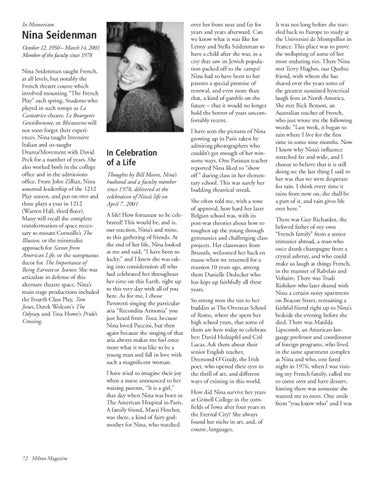over her from near and far for years and years afterward. Can we know what it was like for Lenny and Stella Seidenman to have a child after the war, in a city that saw its Jewish population packed off to the camps? Nina had to have been to her parents a special promise of renewal, and even more than that, a kind of gamble on the future – that it would no longer hold the horror of years uncomfortably recent.
In Memoriam
Nina Seidenman October 12, 1950– March 14, 2001 Member of the faculty since 1978 Nina Seidenman taught French, at all levels, but notably the French theatre course which involved mounting “The French Play” each spring. Students who played in such romps as La Cantatrice chauve, Le Bourgeois Gentilhomme, or Rhinoceros will not soon forget their experiences. Nina taught Intensive Italian and co-taught Drama/Movement with David Peck for a number of years. She also worked both in the college office and in the admissions office. From John Zilliax, Nina assumed leadership of the 1212 Play season, and put on two and three plays a year in 1212 (Warren Hall, third floor). Many will recall the complete transformation of space necessary to mount Corneille’s The Illusion, or the minimalist approach for Scenes from American Life, or the sumptuous decor for The Importance of Being Earnest or Ivanov. She was articulate in defense of this alternate theatre space. Nina’s main stage productions included the Fourth Class Play, Tom Jones, Derek Wolcott’s The Odyssey, and Tina Howe’s Pride’s Crossing.
In Celebration of a Life Thoughts by Bill Moore, Nina’s husband and a faculty member since 1978, delivered at the celebration of Nina’s life on April 7, 2001 A life! How fortunate to be celebrated! This would be, and is, our reaction, Nina’s and mine, to this gathering of friends. At the end of her life, Nina looked at me and said, “I have been so lucky,” and I knew she was taking into consideration all who had celebrated her throughout her time on this Earth, right up to this very day with all of you here. As for me, I chose Pavorotti singing the particular aria “Recondita Armonia” you just heard from Tosca, because Nina loved Puccini, but then again because the singing of that aria always makes me feel once more what it was like to be a young man and fall in love with such a magnificent woman. I have tried to imagine their joy when a nurse announced to her waiting parents, “It is a girl,” that day when Nina was born in The American Hospital in Paris. A family friend, Marti Fletcher, was there, a kind of fairy godmother for Nina, who watched
72 Milton Magazine
I have seen the pictures of Nina growing up in Paris taken by admiring photographers who couldn’t get enough of her winsome ways. One Parisian teacher reported Nina liked to “show off ” during class in her elementary school. This was surely her budding theatrical streak. She often told me, with a tone of approval, how hard her later Belgian school was, with its post-war theories about how to toughen up the young through gymnastics and challenging class projects. Her classmates from Brussels, welcomed her back en masse when we returned for a reunion 10 years ago, among them Danielle Dedecker who has kept up faithfully all these years. So strong were the ties to her buddies at The Overseas School of Rome, where she spent her high school years, that some of them are here today to celebrate her: David Holzapfel and Ceil Lucas. Ask them about their senior English teacher, Desmond O’Grady, the Irish poet, who opened their eyes to the thrill of art, and different ways of existing in this world. How did Nina survive her years at Grinell College in the cornfields of Iowa after four years in the Eternal City? She always found her niche in art, and, of course, languages.
It was not long before she traveled back to Europe to study at the Université de Montpellier in France. This place was to prove the wellspring of some of her most enduring ties. There Nina met Terry Hughes, our Quebec friend, with whom she has shared over the years some of the greatest sustained hysterical laugh fests in North America. She met Rick Benson, an Australian teacher of French, who just wrote me the following words: “Last week, it began to rain where I live for the first time in some nine months. Now I know why Nina’s influence stretched far and wide, and I choose to believe that it is still doing so: the last thing I said to her was that we were desperate for rain. I think every time it rains from now on, she shall be a part of it, and rain gives life over here.” There was Guy Richardot, the beloved father of my own “French family” from a senior trimester abroad, a man who once drank champagne from a crystal ashtray, and who could make us laugh at things French, in the manner of Rabelais and Voltaire. There was Trudi Rishikov who later shared with Nina a certain noisy apartment on Beacon Street, remaining a faithful friend right up to Nina’s bedside the evening before she died. There was Matilda Lipscomb, an American language professor and coordinator of foreign programs, who lived in the same apartment complex as Nina and who, one fated night in 1976, when I was visiting my French family, called me to come over and have dessert, hinting there was someone she wanted me to meet. One smile from “you know who” and I was
